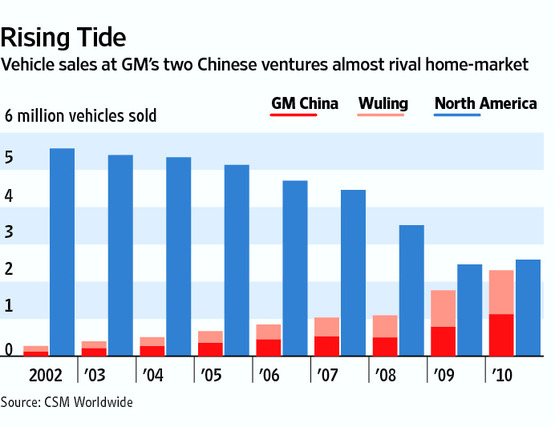The rise of the rural market
 Friday, May 20, 2011 at 8:46AM
Friday, May 20, 2011 at 8:46AM 
WSJ story on GM betting big on China's rural market and FT story on Lenovo planning to use the selling expertise it gained there to penetrate similar bottom-of-the-pyramid markets in Indonesia, Brazil, Mexico, India and Turkey.
Per the chart above, you can see GM's logic plainly: China is already a market roughly equal to its US share.
Per both, you begin to understand the logic that says, To sell globally is to succeed first in China. Why? It's not just the market size, but the BOTP experience gained. Thus the larger logic of allying with Chinese firms as they go global. Master the one, progress to them all.
The rise of the global middle class necessitates being able to sell in the rural market, because that's where a good chunk are located amidst all the urbanization between now and 2050 (we basically double the number of urbanites globally from 3.3B to 6.6B). In marketing terms, this is Leninist-Maoist: Go back in time and catch your target in their pre-branded state!
First car and PC sale is like first vote as adult: brand affiliation is often set for life, so the effort is more than worthwhile for a GM and Lenovo.
 bottom of the pyramid,
bottom of the pyramid,  global economy | in
global economy | in  Citation Post |
Citation Post |  Email Article |
Email Article |  Permalink |
Permalink |  Print Article
Print Article 









Reader Comments (1)
After the American Revolution, our rural farm communities became a critical market for England's emerging global machinery manufacturing economy sector. We modified their products for our environment, made some ourselves, then bought new developments from English. Informal partnerships emerged.
So many things 'new' are reruns.
I'm still mystified how few media articles, or political comments, reflect on how NIST and DARPA pioneered software/hardware for small parts manufacturing a few decades back. They then pressed for international digital software standards 'to benefit our military and manufacturers' logistics support. Then, 'surprise,' many existing US manufacturing activities were outsourced to computers and global parts facilities.